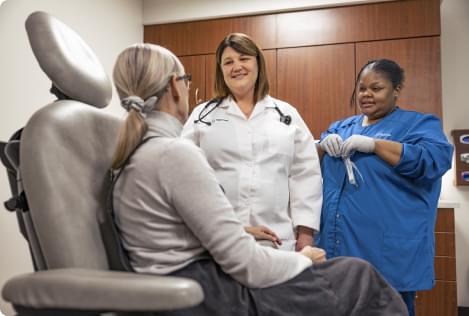Overview
POEMS syndrome is a rare blood disorder that damages nerves and affects other parts of the body. POEMS stands for symptoms of the condition. Symptoms may include weak legs, trouble breathing, a larger spleen or liver, and skin changes.
Without treatment, POEMS syndrome gets worse quickly. It can become life-threatening. So early diagnosis is vital.
There's no cure for POEMS syndrome. But treatment might improve symptoms. Treatment may include radiation therapy, chemotherapy and stem cell transplant. The outlook for people with POEMS syndrome has improved greatly over the years.
Symptoms
The symptoms of POEMS syndrome make up its name. Symptoms most often appear over weeks to months. They include the following:
- Polyneuropathy. This may include numbness, tingling and weakness in the legs. In time, it might affect the hands. It also involves trouble breathing. Polyneuropathy must be present for a POEMS diagnosis.
- Organomegaly. This is an enlarged spleen, liver or lymph nodes.
- Endocrinopathy and edema. Atypical hormone levels can cause an underactive thyroid, also called hypothyroidism. The hormone levels also can cause diabetes, sexual issues, tiredness, and swelling in arms and legs.
- Monoclonal protein. This is a protein that atypical plasma cells in bone marrow make. The monoclonal protein goes into the bloodstream. This must be present for the diagnosis of POEMS syndrome. Monoclonal protein often is linked with bones getting harder or thicker.
- Skin changes. This may involve having more color than usual on the skin. There may be red spots, which may be harder to see on Black or brown skin. The skin might be thicker. There might be more hair on the face or the legs.
Not all the symptoms of POEMS syndrome are in the name. And not everyone with POEMS syndrome has all the symptoms in the name. But everyone with POEMS syndrome has polyneuropathy and monoclonal protein.
Other symptoms some people with POEMS syndrome have spell out PEST. PEST stands for:
- Papilledema. This is swelling in the back of the eyes.
- Extravascular volume overload. This might include ankle swelling, fluid between the lung and the ribs, or fluid in the belly.
- Sclerotic bone lesions. X-rays can show these bone spots. They're most often not painful.
- Thrombocytosis and erythrocytosis. These are higher levels of red cells and platelets in the bloodstream.
When to see a doctor
Make an appointment with your healthcare professional if you have any of the symptoms of POEMS syndrome.
Causes
Experts don't know the cause of POEMS syndrome. But people with POEMS syndrome have a higher number of plasma cells. These cells make too much of a type of protein, called monoclonal protein. This protein can damage other parts of the body.
Risk factors
Factors that raise the risk of POEMS syndrome include:
- Older age. POEMS syndrome most often happens after age 50.
- Male sex. People assigned male at birth are a bit more likely to get POEMS syndrome than are people assigned female at birth.
Diagnosis
A healthcare professional takes a medical history and does a physical exam to diagnose POEMS syndrome. A healthcare professional also does an exam to check the nervous system, called a neurological exam. POEMS syndrome can be hard to diagnose because the symptoms are complex, and they affect many organs.
Tests
There might be several tests for POEMS syndrome. They include:
-
Electromyographic studies. Also called EMG studies, this test measures the electrical activity of muscles. A healthcare professional puts small needles called electrodes into the skin.
The electrodes measure the electrical activity of the muscle at rest and when tightened. This can show how well the muscle and the nerves that control it work.
- Nerve biopsy. A healthcare professional removes a small piece of nerve for study under a microscope.
- Imaging tests. These might include CT scans or positron emission tomography, also called PET scans. This can help find the bone hardening that is common in POEMS syndrome.
- Blood tests. Blood tests such as a complete blood count, also called a CBC, can give information about your condition. Another type of blood test may involve looking at a sample of your blood under a microscope. This is called a peripheral blood smear.
- Urine tests. A healthcare professional may ask you to collect your urine for 24 hours for study under a microscope.
Treatment
Treatment for POEMS syndrome might ease symptoms but doesn't cure the condition. Treatments include radiation therapy, chemotherapy and stem cell transplant. The outlook for people with POEMS syndrome has improved greatly over the past decade or so.
- Radiation therapy. This uses powerful energy beams. People whose POEMS syndrome is limited to a small area may have this type of therapy.
- Chemotherapy. This treats POEMS with strong medicines. People whose POEMS syndrome is more advanced may have this type of therapy.
- Bone marrow transplant. A bone marrow transplant, also called a bone marrow stem cell transplant, involves putting healthy bone marrow stem cells into the body to help bone marrow work better. Some people with advanced POEMS syndrome may have this type of therapy.
- Physical therapy. This can help with the weakness and other symptoms of polyneuropathy.
Preparing for an appointment
You might start by seeing your primary healthcare professional. You may be sent to a specialist in blood conditions, called a hematologist. Here's some information to help you get ready for your appointment.
What you can do
When you make the appointment, ask if there's anything you need to do in advance, such as fasting before having a certain test. Make a list of:
- Your symptoms, including any that seem unrelated to the reason for your appointment, and when they began.
- Key personal information, including major stresses, recent life changes and family medical history.
- All medicines, vitamins or other supplements you take, including the dosages.
- Questions to ask your healthcare professional.
Take a family member or friend along, if possible, to help you remember the information you get.
For POEMS syndrome, some basic questions to ask your healthcare professional include:
- What's likely causing my symptoms?
- Other than the most likely cause, what are other possible causes for my symptoms?
- What tests do I need?
- Is my condition likely to go away or to last?
- What's the best course of action?
- I have these other health conditions. How can I best manage them together?
- Are there restrictions I need to follow?
- Are there brochures or other printed material I can have? What websites do you suggest?
Be sure to ask all the questions you have.
What to expect from your doctor
Your healthcare professional is likely to ask you questions, such as:
- Do you always have your symptoms or do they come and go?
- How bad are your symptoms?
- What, if anything, seems to ease your symptoms?
- What, if anything, seems to make your symptoms worse?
© 1998-2026 Mayo Foundation for Medical Education and Research (MFMER). All rights reserved. Terms of Use


